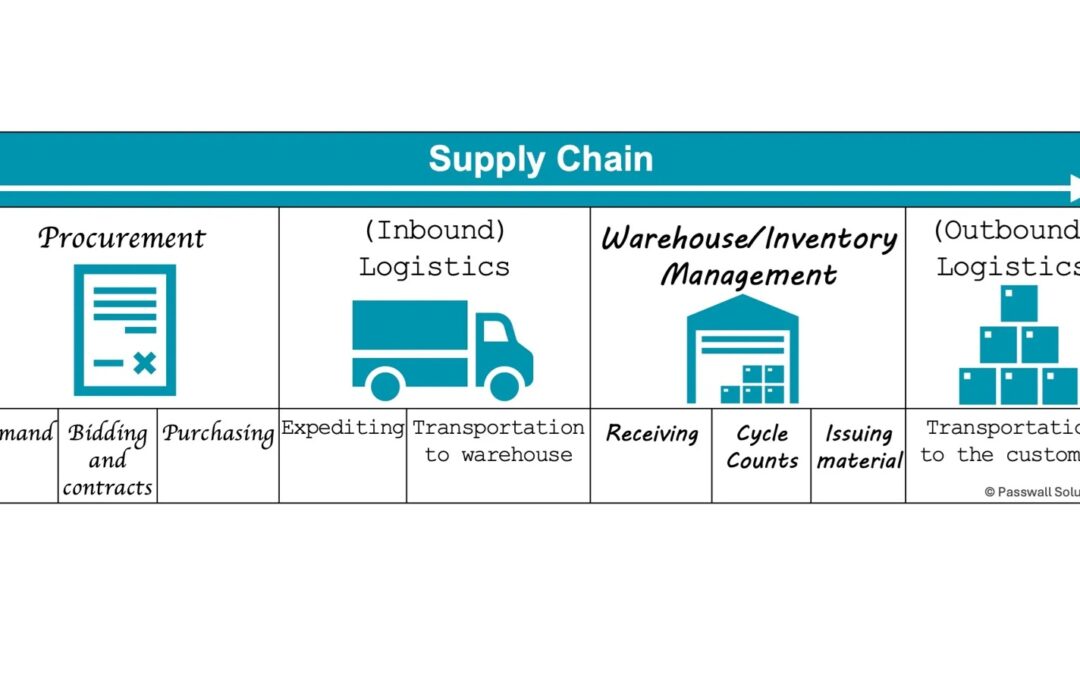Why is Supply Chain Management important? I stumbled across this question recently, and it got my wheels turning on why my chosen profession matters. While people I talk to now generally know what supply chain teams do (we get you the proverbial or literal toilet paper), there’s more to it than that. I’ve worked for a couple of companies now where the supply chain or procurement teams are composed entirely of people with no supply chain training. While this is a common path into supply chain management and many of these people are very talented, it also can lead to an entirely tactical team, focused on cutting POs and expediting orders, and not on the full supply chain process. So let’s talk about the importance of having a supply chain management program, and its benefits to an organization.
Strategic View
A good supply chain team offers an organization a strategic view of the inputs and outputs flowing through the business. This isn’t limited to materials received and then finished goods shipped, it also applies to software, contracting, and perhaps even employee benefits. A well-integrated supply chain team finds synergies between services and the best supplier for each task.
Self-Funded (and more!)
Supply Chain Management pays for itself, and often a couple other departments as well. The savings found and captured by the supply chain team should be multiples of their salaries, and go directly to the bottom line. Any time I see a company cut supply chain team members (especially category or commodity managers) during a downturn, I shake my head. An economic downturn is when the supply chain team can really shine as they have more leverage with suppliers. Suppliers are more likely to offer good value when their sales are down, and a company who can take advantage of that value will come out of the downturn better than they went in. Supply chain management experts know how to surgically strike at the best opportunities while not running suppliers out of business. While a supply chain team can definitely be overstaffed, as a whole the team should be “free” to the organization if they focus on bringing organizational value.
Improve Resilience
If we learned nothing else from the COVID-19 pandemic, we learned that if the supply chain crumbles, organizations tied to that supply chain crumble. There are a multitude of training and software options to assist with improving resilience, but the key consideration is determining how much a business wants their supply chain team to focus on building resilience. This focus can be anything from letting the market whims dictate behavior to well-mapped supplier tiers down to raw materials and full contracts with every supplier. Most businesses fall in between, with more businesses on the “market whims” side than the “fully mapped and contracted” side. Note that supply chain resilience is like an electric utility – when it’s working well, it’s completely invisible. You flip a light switch and the lights come on, and you think nothing of it. Or you order something and it appears on the shelf, waiting for the business to need it. Don’t let that invisibility fool you into thinking resilience is easy or unworthy of investment.
Gap Bridgers
The supply chain team talks to everyone, from the front line in an organization up to the C-suite. Almost everyone in an organization needs the supply chain team, so that team bridges the gaps between different ranks or departments within a business. If the supply chain team is focused on relationship building (as they should be) instead of simply caring about how many purchase orders they can cut each day, they can help be the glue that holds an organization together. Communicating about business needs and bringing different teams together to write a good scope of work with all the stakeholders results in additional benefits. A business is ultimately made up of people, and people who have been on a bid team together are more likely to pick up the phone and call a team member about another question or opportunity for synergy.
Tracking
The logistics team knows where your stuff is. A well-managed supply chain (and not one where everyone is passively waiting for orders to show up) has good visibility on materials en route, both inbound and outbound. The sales team needs this to satisfy the customer, and the engineering team needs it to track project timelines and make adjustments. The larger supply chain team should have access to contracts and agreements, which means they can also track services and contractors for the business. Tracking doesn’t have to be limited to physical materials, and there is huge value in a business knowing where “stuff” is.
Improve Cash Flow
Supply chain management improves cash flow. It does this both by reducing inventory to free up that cash, and by negotiating better supplier payment terms. In terms of inventory, having a strong supply chain management team means ensuring the right materials are on the warehouse shelves at the right time, price, and quality level. When inventory is optimized, material is flowing in and out of the warehouse regularly, and cash for that inventory is constantly being converted into sales. Stagnant inventory represents locked cash flow. Similarly, longer payment terms mean a business can make use of its revenue and cash flow longer or have more cash flow available for financing. It is important to consider suppliers carefully, however, as smaller suppliers may need shorter payment terms to keep cash flow going within their own business. Putting good suppliers out of business benefits no one.
Supplier Relationships
Suppliers are experts in their own fields. When a supply chain management program has good supplier relationships and focuses on lowering overall risk (instead of simply shoving it into a supplier’s lap), suppliers can use their expertise to offer value. Suppliers know about innovations and research, the limits of their product, and the best applications for their products and services. A supplier with a poor relationship will not be forthcoming about these value-added offerings, and may not truly understand their customers’ applications of the technology. Poor supplier relationships lead to suppliers only doing the bare minimum to complete the work, and don’t get into the deeper value that can come from good relationships. A supply chain management program focuses on and strengthens supplier relationships, opening doors to better value and lower risk.
Hopefully this was helpful in framing the value of a supply chain management program, and perhaps highlighting areas where your own supply chain management team could be adding more value to the organization. If you would like to chat about any of these opportunities, let’s schedule a meeting.




